In partnership with the Central Bank of Nigeria and with support from J.P. Morgan, Goldman Sachs, the Wheeler Institute for Business and Development at London Business School welcomed Olayemi Cardoso, Governor of the Central Bank of Nigeria (CBN), for an in-depth conversation with Professor Hélène Rey, Lord Bagri Professor of Economics at LBS. A recording of this event is available in this blog and on the Wheeler Institute YouTube channel here.
This event was opened by Tiago Martinho, Executive Director of the Wheeler Institute for Business and Development and by Dr. Nkiru Balonwu, Advisor to the Governor on Strategic Communications & Stakeholder Engagement at the CBN. Olumayokun Adebiyi Ajibade, Special Advisor to the Governor on Financial Markets at CBN, gave a presentation on ‘The New Nigeria’ followed by a conversation between Hélène Rey and Olayemi Cardoso. Dr. Victor Ugbem Oboh, Director of the Monetary Policy Department at CBN closed the event.
Governor Cardoso shared his insights spanning across monetary policy and financial reform, his reflections on the journey of steering Nigeria through a complex era of changes, and his outlook of the country’s economic trajectory which now stands at a critical crossroads.
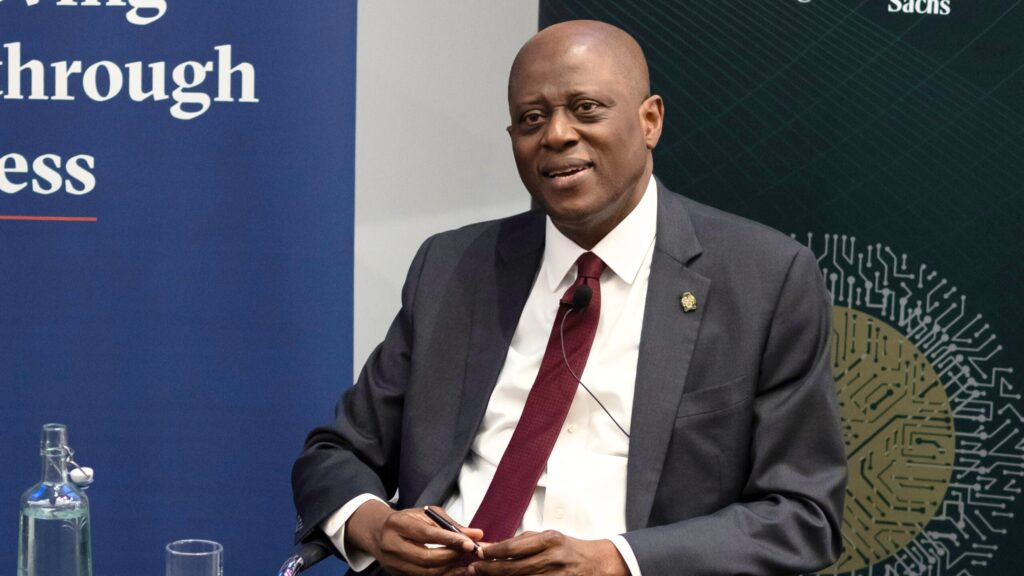
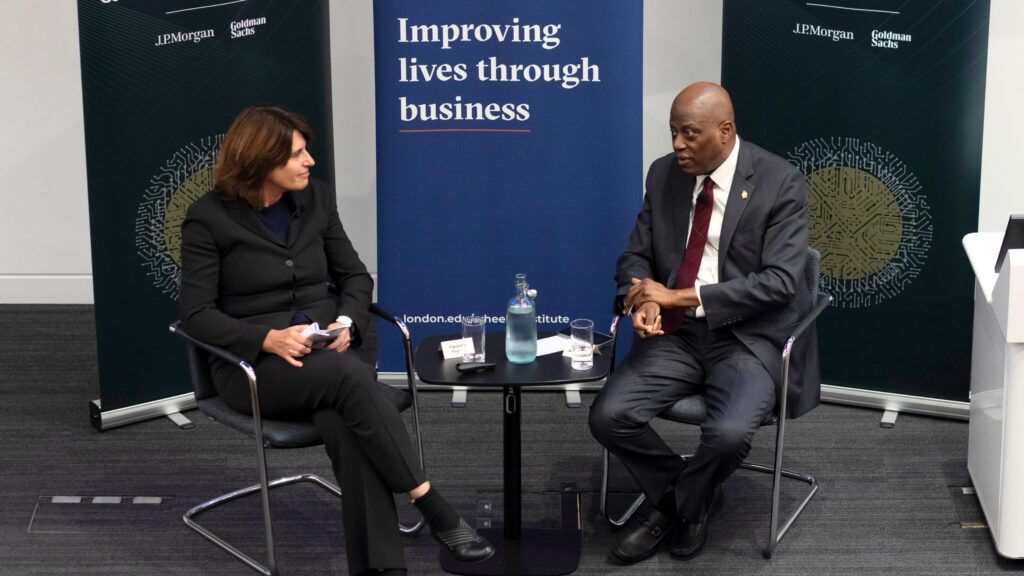
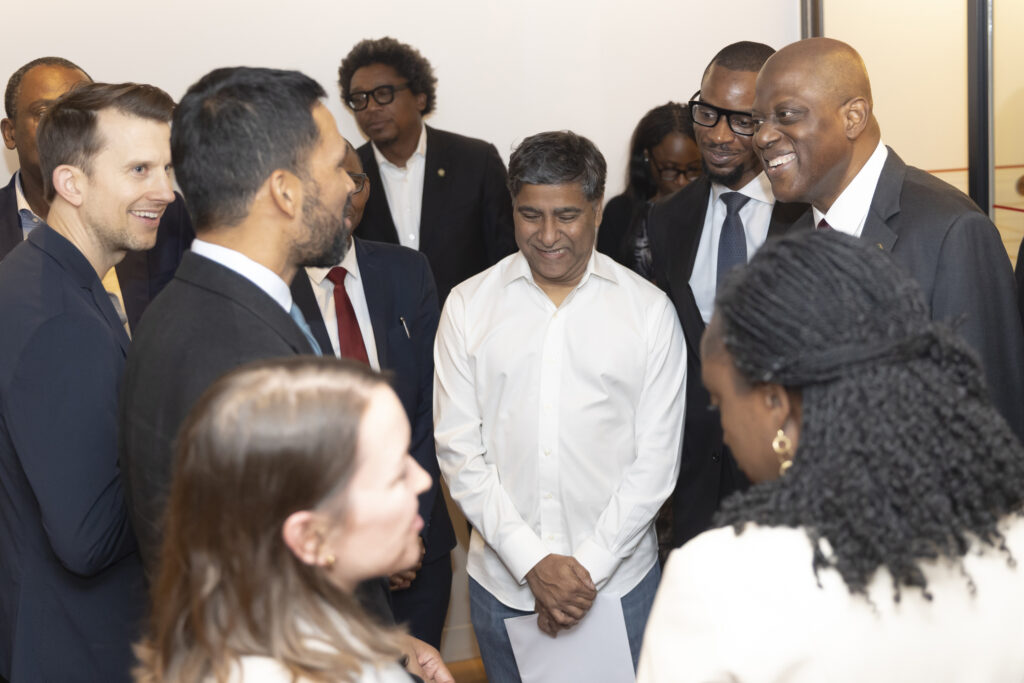

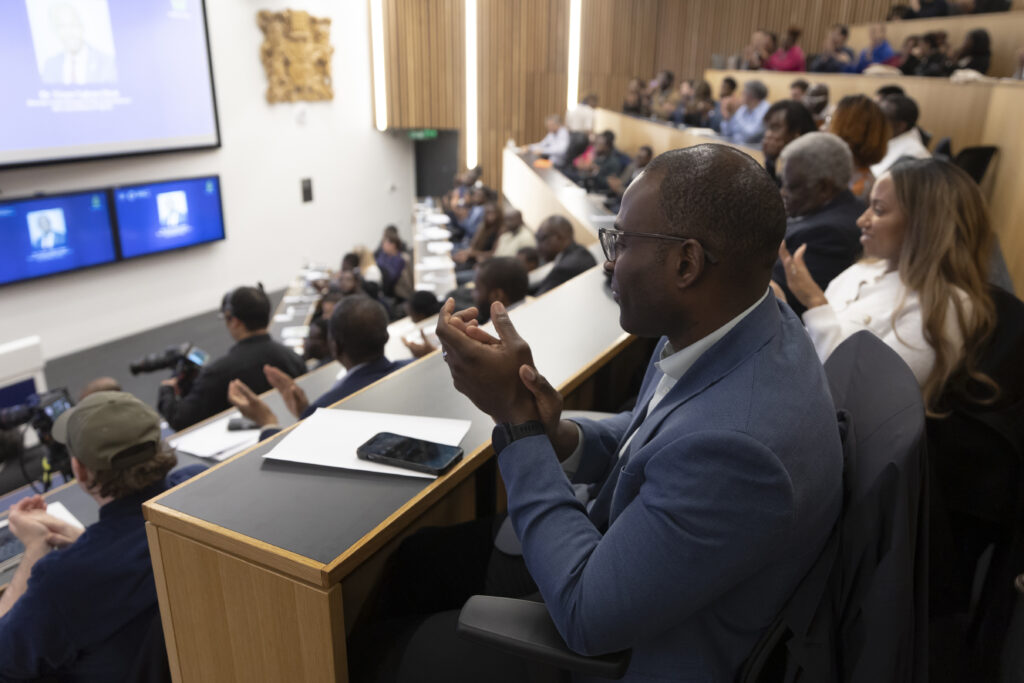
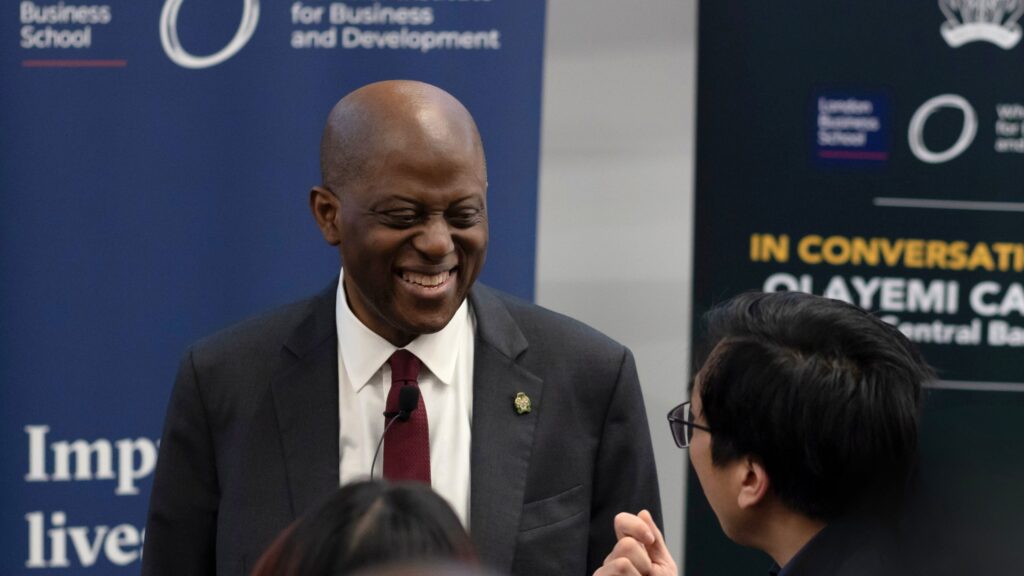
Pre-Reform Economy and the Turn to Structural Transformation
Before reform, particularly between 2015 and 2023, Nigeria’s economy was trapped in a cycle of stagnation and vulnerability. Growth averaged just 1.5% per year—below the 2.6% population growth rate—resulting in declining per-capita income and widening poverty that affected nearly half the population. Inflation surged to record high, while the naira depreciated by more than 70% between mid-2023 and mid-2024. At the same time, debt-servicing costs consumed most federal revenues, and food insecurity reached alarming levels, with more than 26 million Nigerians at risk of poverty.
In June 2023, guided by a commitment to restore macroeconomic stability and rebuild investor confidence, the government and the CBN pursued an integrated strategy of fiscal and monetary reform, including the removal of fuel subsidy, unification of the foreign exchange market, tightening of monetary policy and inflation control, and reforms to the banking sector and tax laws.
By mid-2025, Nigeria’s macroeconomic narrative had begun to shift. Acknowledging the challenges of short-term adjustment, Governor Cardoso described the current stage as a ‘turning point’ as the reforms are beginning to yield results and seta trajectory for sustainable growth. Economic growth has reached 4%, outpacing the estimated 3% population growth for the first time in years. Both the IMF and World Bank have cited Nigeria’s initiatives as essential steps to correct deep imbalances and restore fiscal discipline. Market responses have followed suit, with renewed confidence in Nigerian assets and a modest rebound in portfolio inflows.
Inflation and Monetary Policy
Inflation remains Nigeria’s most visible economic challenge and a central concern for the CBN. Consumer Price Index (CPI) surpassed 24% in mid-2023, the highest in the past 18 years, driven largely by surging energy and food costs. In response, the CBN introduced orthodox monetary policy: a firm tightening to rein in inflation, by raising Monetary Policy Rate (MPR) to above 18% in mid-2023, with a medium-term goal to bring inflation down to around 15%, with a longer-term ambition of reaching single digits. As of October 2025, 2 years into the Governor’s tenure, the inflation rate stands at approximately 18%, reflecting progress toward stabilization amid persistent structural pressures and supply-side constraints.
While the Governor understands that high interest rates are painful, especially for borrowers, he reaffirmed them as a deliberate trade-off as price stability is a prerequisite for sustainable growth and lower rates in the future. Encouragingly, industrial output and trade surpluses have begun to recover, with recent months’ inflation showing signs of moderation. This indicates that the tightening cycle is gaining traction.
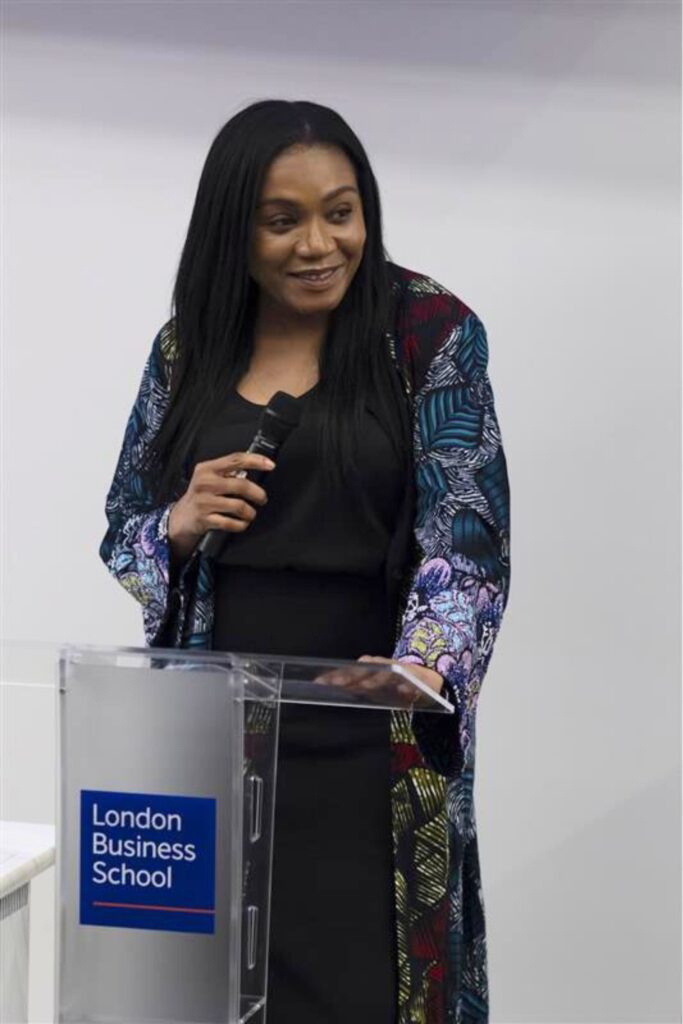
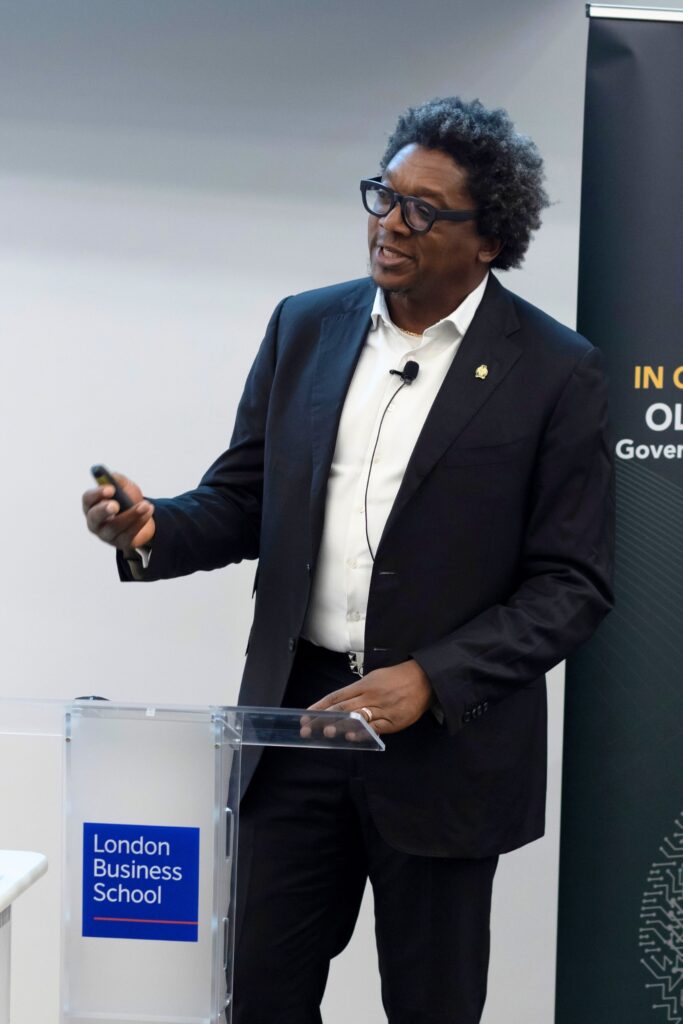
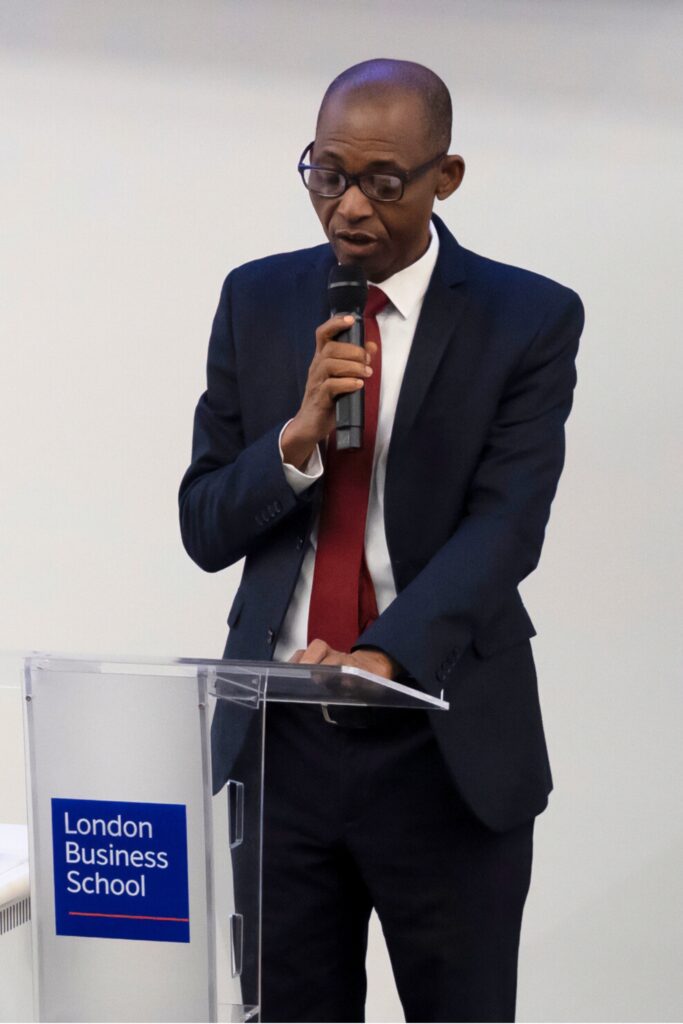
Foreign Exchange (FX) Market Reform
Before the reform, Nigeria maintained multiple exchange rates (official, parallel, etc.), a patchwork that created opportunities for arbitrage and distortions. The unpaid FX obligations—a backlog of over $7 billion—undermined both the naira’s credibility and investor trust.
As part of the reform, the CBN unified the FX windows into a single, market-determined FX rate, facilitated by a ‘willing buyer, willing seller’ model and the Nigerian FX Code. Participants can now see who is transacting, while official interference also reduced. The arbitrage gap between official and parallel markets, once as wide as 50–60%, has narrowed dramatically by over 70%.
Although the naira initially depreciated sharply, the market quickly began to stabilise. Transparency has improved, and liquidity is returning to the market. Businesses and investors can access FX through formal channels with more confidence and ease.
The Governor noted that even though the naira’s nominal value is lower, naira is now finding its equilibrium and exchange rate volatility has reduced. He noted that a functioning FX market is critical for predictability in pricing and planning, reduced speculation, and containing inflation expectations.
Banking Sector Reform and Market Confidence Building
Another critical pillar of the reform agenda is the ongoing recapitalisation of the banking sector, aimed at strengthening the resilience and depth of Nigeria’s financial system. Overtime, banks’ capital bases had eroded in real terms relative to the size of the economy and the impact of currency devaluation. With Nigeria’s expanding GDP and rising trade volumes, there is a clear need for stronger balance sheets capable of supporting higher levels of credit intermediation and investments.
The CBN has set new, tiered capital requirements based on banks’ authorisation level. Under the framework, banks have the flexibility to choose their authorisation level (international, national, regional, etc.) based on their capital strength. To meet the capital requirements, banks can explore various options including reclassification, adjusting their licenses as conditions change, or consolidation, engaging in mergers and acquisitions.
The policy’s design i.e., combining flexibility with prudential discipline, has so far produced signs of orderly adjustment rather than systemic stress. Market sentiment has responded positively: several Nigerian bank stocks appreciated following the announcement, reflecting renewed investor confidence in the sector’s long-term outlook. As the CBN Governor noted, the measure is “a recalibration for growth,” intended not as a punitive exercise but as a strategic effort to steer banks toward productive, real-sector lending and build a financial system robust enough to sustain Nigeria’s expanding economy.
Reflections and Outlook on Big Trends:
- Global turbulence and external shocks
Despite global uncertainty—volatile dollar movements, trade frictions, and capital flow reversals—Nigeria’s relative resilience has been noteworthy. Governor Cardoso argued that because Nigeria had already implemented difficult reforms before global shocks intensified in early 2025, the country has been less exposed and more resilient compared to pre-reform state. “If the turbulence of April had come a year earlier,” he said, “the impact would have been far greater.”
- Digital currencies and innovation
The CBN’s stance on digital assets has evolved significantly. After a period of strict prohibition, the CBN now embraces a regulatory engagement approach, coordinating with the Securities and Exchange Commission. The Governor acknowledged that the rapid growth of crypto use in Nigeria related to citizens seeking alternative stores of value during the FX crisis. The CBN is exploring frameworks to oversee digital finance safely, with the focus on protecting users, understanding risks, and encouraging innovation within boundaries. “Our role is to understand and regulate innovation effectively, rather than pushing innovation away”, he noted.
The CBN also recently held a leadership discussion themed “Digitisation and AI”, with plans to accelerate its own digital transformation and embed AI across departments, such as implementing internal AI-driven forecasting models. Artificial intelligence and digitisation, the Governor noted, will “define the next era of central banking”, urging banks to be future-ready, with improved data analytics, fraud detection, and policy efficiency.
- Climate change, food security, and inequality
Governor Cardoso also placed emphasis on climate change and food security, describing them as integral to monetary stability. Extreme weather has disrupted food supply chains, amplifying inflationary pressures. In response, the CBN is working with fiscal authorities to strengthen agricultural finance and resilience.
On inequality, the Governor was frank: reforms create winners and losers, and the short-term pain of adjustment must be cushioned by social protection. “We cannot sustain growth without equity,” he said. Fiscal policy, he noted, can build safety nets even as structural transformation proceeds.
Policy Communication and Coordination
When reflecting on reform challenges, Governor Cardoso noted communication as the biggest challenges for any central bank. Clear, consistent messaging from policymakers that clarify policy rationales is vital for the market to anchor expectations, understand the short-term pain and long-term projections. Transparency is now part of the bank’s reform culture, as the CBN plans to improve its outreach to the public and stakeholders to rebuild trust in institutions.
Another the reflection from the Governor about reform is the strong coordination between the Central Bank and fiscal authorities. Monetary tightening without fiscal discipline is ineffective, while fiscal expansion without monetary support can reignite inflation. “Neither monetary nor fiscal policy can succeed alone,” the Governor noted. “They must speak the same language.” The coordination has improved recently, and both sides aim to maintain consistency especially as Nigeria approaches election season in 2026.
Conclusion
Nigeria’s monetary authorities have undertaken some of the most difficult yet necessary reforms in the country’s modern economic history. The challenging corrections have begun to yield stability and credibility: Inflation, though still elevated, is trending downward; the naira, though weaker, is more predictable; and banks, though adjusting, are stronger.
Sustaining this progress requires ongoing coordination, communication, and consistency, and the CBN remains committed to stability, transparency, and innovation. Nigeria is still on a path from instability to stability, from distortion to transparency. The continued partnership among government, investors and citizens is vital to unlock the country’s full potential, to succeed in a reform that can set a precedent for other emerging economies.
About the speakers
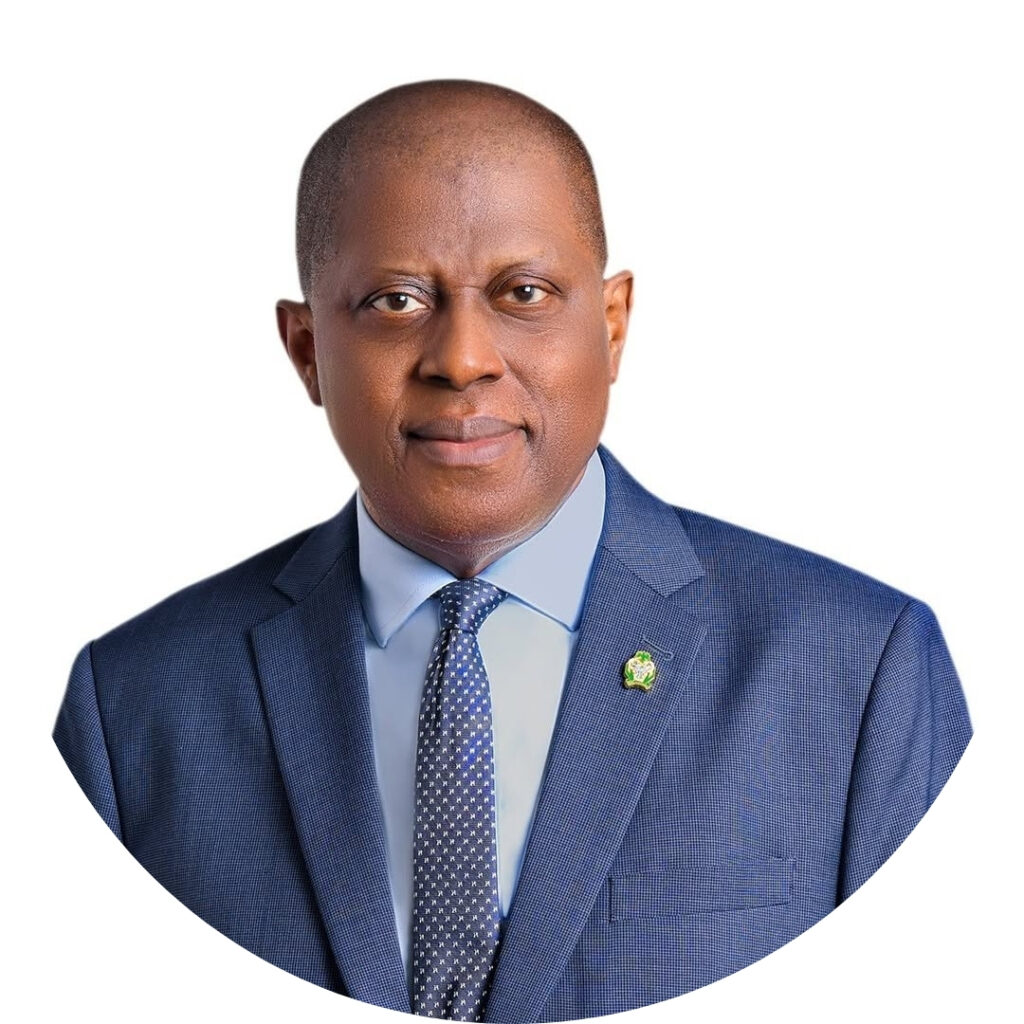
Olayemi Cardoso is the Governor of the Central Bank of Nigeria. He has over 29 years of experience in commercial banking, including serving as Chairman of Citibank Nigeria Ltd from 2010 to 2022. Cardoso has also had a notable career in the public sector, previously serving as Commissioner for Economic Planning and Budget in the Lagos State Government. He has held various board memberships and chairmanships, including the Lagos Economic Summit Group and Africa Venture Philanthropy Alliance. He is also a Fellow of the Chartered Institute of Stockbrokers. Having worked with numerous financial institutions and government agencies, and participated in several high-profile economic development initiatives, he is a leading figure in Nigeria’s financial sector.

Hélène Rey is the Lord Bagri Professor of Economics at London Business School. Until 2007, she was at Princeton University, as Professor of Economics and International Affairs. Her research focuses on the determinants and consequences of external trade and financial imbalances, the theory and empirics of financial crises and the organization of the international monetary system. She was elected President of the European Economic Association in 2022. Professor Rey is an elected Fellow of the British Academy, of the Econometric Society, of the European Economic Association, of the American Academy of Arts and Sciences, a Foreign Honorary Member of the American Economic Association, a correspondent of the Académie des Sciences Morales et Politiques. She was made O.B.E for services to Economics.
About the writer

Luise Lin is an MBA 2026 candidate at London Business School and an Outreach and Communication Intern at the Wheeler Institute for Business and Development. Prior to joining London Business School, she worked at Boston Consulting Group as Consultant in Australia, where she advised clients across private and public sectors as well as social enterprises. Luise is passionate about leveraging innovative business models and financial solutions to drive scalable economic development impact in developing regions. She is particularly interested in the intersections of management, policies, and social impact, exploring how private sector solutions can contribute to sustainable development.
